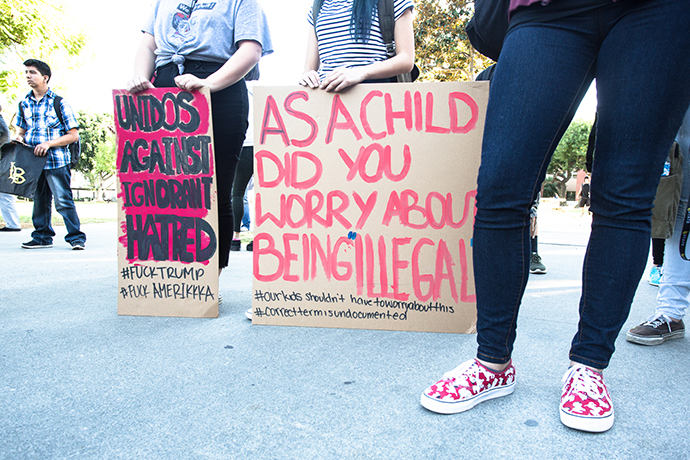President-elect Donald Trump’s pledge of mass deportations and changes to the Deferred Action for Children Arrivals has left hundreds of thousands of undocumented people with an uncertain future in the United States.
DACA allows students, also known as DREAMers, who were brought to the United States before June 2007 and under the age of 16 upon arrival to apply for a two-year renewable work permit. This allows them to obtain a social security number, attend college and grants them protection from deportation.
However, since DACA is an executive order issued by President Barack Obama, the incoming Trump administration could overturn it.
Executive orders have been reversed by incoming presidents. For instance, when Obama took office after George W. Bush, he repealed Bush’s ban on federal funding for stem cell research.
According to a Los Angeles Time article, “Beneficiaries of Obama’s immigration relief worry about future under Trump,” there are an estimated 742,000 recipients of DACA living in the United States, with about one third of them living in California. Approximately 650 undocumented students attended Cal State Long Beach last year, paying full tuition and student fees through DACA.
“As much as it pains me to say, DACA amended students are a signature away from losing that status,” Rafael Topete, director of the Dream Success Center, said.
Trump re-stated that he intends to deport millions of undocumented immigrants on Sunday’s broadcast of CBS’s 60 Minutes. He said he would first go after undocumented people with criminal records, of which he said there were two or three million.
He added that after securing the borders, a decision would be made for the remaining 10 million undocumented immigrants.
His statements and proposals have resulted in almost daily protests. Students in East Los Angeles left classes and marched the streets in a walk-out protest on Monday and students in Washington D.C. did the same on Tuesday. Protesters held signs saying “not my president” in cities across the country with one protest turning violent in Portland.
Students on college campuses have reported harassment since Trump’s election. According to an article from the New York Times, “Campuses Confront Hostile Acts Against Minorities After Donald Trump’s Election”, racist posters were found in a men’s restroom at Texas State University.
Additionally, racist photos and videos have appeared online, one showing students wearing blackface at University of Oregon.
“There’s real anger and fear that our students are feeling and we understand that. We’re trying to be as supportive and reassuring as we can,” Topete said.
CSULB President Jane Close Conoley responded to student’s concerns over the election results in an email Monday saying that violence against undocumented, Muslim, Jewish, underrepresented and LGBT students will not be tolerated.
“Our dedication to Inclusive Excellence means that we will offer the best learning and working environments to every member of the Beach Community,” Conoley said in the email. “We will be attentive to particular needs of various groups while striving to make the Beach experience one that all know as welcoming and empowering.”
Anna Sandoval, professor and department chair of Chicano and Latino Studies, responded to concerns as well, sending an email saying they will continue to assist students and refer them to campus resources including the CSULB Dreamers Success Center, Counseling and Psychological Services, Women, Gender and Equity Center and the CSULB LGBT Student Resource Center.
Topete said that California will continue to pursue the progressive laws the state has passed to support undocumented peoples and denounce Trump’s rhetoric.
“The fact that we have sanctuary cities is great and they’re going to help protect individuals,” Topete said. “We’re going to have to wait and see what comes and see what the [Trump] administration does to counteract [them] as they have already stated their displeasure of sanctuary cities.”
Sanctuary cities have laws or policies which protect undocumented immigrants from being prosecuted against solely for breaking immigration laws. Most cities prevent law enforcement from asking individuals about their immigration status.
Los Angeles Police Chief Charlie Beck said on Monday that the LAPD would not involve themselves in deportation efforts by the federal government. Other sanctuary cities in California include Berkeley, Oakland, San Jose, San Francisco and Santa Ana.
Topete referred students concerned about the Trump presidency to the Mexican American Legal Defense and Education Fund. There is a FAQ available on their website for questions on applying or renewing for DACA and advice for what decisions those affected can make.




